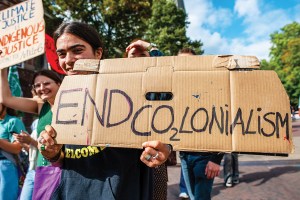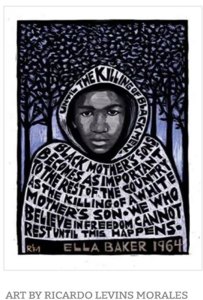While it is true that we face the new year at a time when social fractures and economic divides fuel a tsunami of fear, anger, falsehoods, conspiracy theories, and in some cases, a politics wedded to violence, we need to summon the courage to reject normalizing such events. As such, we can never let hope turn into the pathology of cynicism, or worse.
Department of Sanitation workers clean up confetti and trash after New Year’s Eve in Times Square on January 1, 2022, in New York City. ALEXI ROSENFELD / GETTY IMAGES
As I get older, holidays, especially the emergence of a new year, become both a time of remembrance and joy. They offer memories steeped in both new beginnings and loss; the value of loved ones and close friends; the beauty of solidarity forged in giving and sharing; and a hope that merges struggle, passion and justice.
The dawn of the new year rests not merely on long-cherished narratives but also offers a time for renewed visions. It is also about birth, the emergence of new possibilities, the weighing of mistakes, a renewed sense of struggle against the haters, liars, and the dreadful conditions that produce and support them. It is about a gentle kiss and touch that comes early in the morning with the ones you love. Such moments speak to falling into the comforting abyss of desire, becoming more conscious of what it means to make yourself vulnerable so you can step outside of the privatized prisons that a brutal economic system puts us in.
In a time of apocalyptic cynicism, the normalization of violence and deepening collective despair, thinking about the new year is more than a discourse of traditional aspirations. On the contrary, it is an interruptive and critical moment crucial to examining the horrors of a present descending all too quickly into fascism and what it might mean to create a new language, vision and motivations to embrace a future that imagines the fullness of justice, compassion, equality and democracy.
Thinking about the new year is and should be an act of resistance.
The new year offers a space to ponder what it means to reclaim history as a site of struggle, resistance and civic courage. This suggests reclaiming historical memory as a site of learning and resistance; it means making education central to politics; it means utilizing both a language of critique and a discourse of hope; it means building a mass movement with international ties in the struggle for social and economic justice. Under such circumstances, the cry for justice, equality, and freedom takes on a new urgency and offers up new possibilities. It infuses the present with the fire of wakefulness, longing for and hopefully producing a new language for reclaiming our sense of agency, consciousness, and the courage to never look away. Hope expands the space of the possible and becomes a way of recognizing and naming the incomplete nature of the present. The new year suggests giving new meaning to the promise of a world without suffering, inequality and the anti-democratic forces sprouting up like dangerous weeds. The new year should offer the opportunity to rethink life, dignity, and a humane equality as they unfold in their fullest and always with others. The new year should be rooted in dreams that reject a vision of the future as simply a continuation of the present.
Let’s make 2022 a year to talk back, beat down the fascist currents sweeping across the United States and elsewhere. Let’s make it a time that brings together the fractured movements on the left in order to build a mass movement and political party that speaks with the people rather than against them.
I realize that these words of hope come at a difficult time in the United States, Canada and across the globe. Civic courage and the social contract are under siege. Educators, artists and public intellectuals underplay the connection between fascism and capitalism. The government has failed miserably to deal with the COVID crisis. And we face a cultural landscape dominated by the empty ballast of the mainstream media that lacks the courage to both deal with the growing threat of authoritarianism and to name neoliberal capitalism and white supremacy as organizing principles of American politics. We live at a time in which disorder and manufactured ignorance have become normalized. Too many Americans view freedom as simply an individual right and ignore the fact that it is also a matter of social responsibility. Civic illiteracy is now wrapped in a false appeal to freedom. Civic courage loses its ethical moorings when it fails to relate the collapse of conscience to the collapse of the welfare state.
Struggling for a better world seems almost incomprehensible in a society where the pathology of power, privatization and greed have turned the self-inward to the point where any notion of social commitment and struggle for social justice appears either as a weakness or is treated with disdain. Freedom has partially collapsed into a moral nihilism that creates a straight line from politics to catastrophe to apocalypse. Chaos, uncertainty, loneliness and fear define the current historical moment. In too many cases, learned helplessness leads to learned hopelessness. A culture of consumerism, sensationalism, immediacy, and manufactured ignorance obscures how political and moral passions substitute sheer rage, anger and emotion for a thoughtful defense of truth, the social contract, civic culture, a culture of questioning and democracy itself.
We need a language that views politics more comprehensively, connects the dots among diverse issues, and offers empowering strategies for creating mass movements.
Of course, there are clear and powerful examples of civic courage among young people, the Black Lives Matter Movement, educators, health care workers, union organizers, and others fighting social injustices and systemic racism while caring for the sick, dispossessed, and those bearing the weight of poverty, bigotry and hatred. These inspiring and brave agents of democracy offer a history and sense of the present that allow us to greet the new year with a vision of what a different future would look like, one born out of moral witnessing, the social imagination, civic courage and care for others.
While it is true that we face the new year at a time when social fractures and economic divides fuel a tsunami of fear, anger, falsehoods, conspiracy theories, and in some cases, a politics wedded to violence, we need to summon the courage to reject normalizing such events. As such, we can never let hope turn into the pathology of cynicism, or worse.
In the midst of a surging authoritarianism, we do not have a language that fully comprehends the crisis Americans face politically, economically and socially. We need a language that views politics more comprehensively, connects the dots among diverse issues, and offers empowering strategies for creating mass movements.
Hopefully, the new year will offer us the time to construct a visionary language as a condition for rethinking the possibilities that might come in the future, one that offers the promise of a sustainable democracy. Values such as freedom, solidarity and equality need to “breathe” again, develop deeper roots, and renew an individual and collective sense of social responsibility and joint action. We need to throw out the harmful assumptions that turn freedom into a toxic notion of selfishness, hope into a crushing cynicism, and politics into a site of indifference, cruelty and corruption. The new year should push us to reclaim the virtues of dignity, compassion and justice. It should remind us of the necessity to dream again, imagine the unimaginable, and think otherwise in order to act otherwise.


